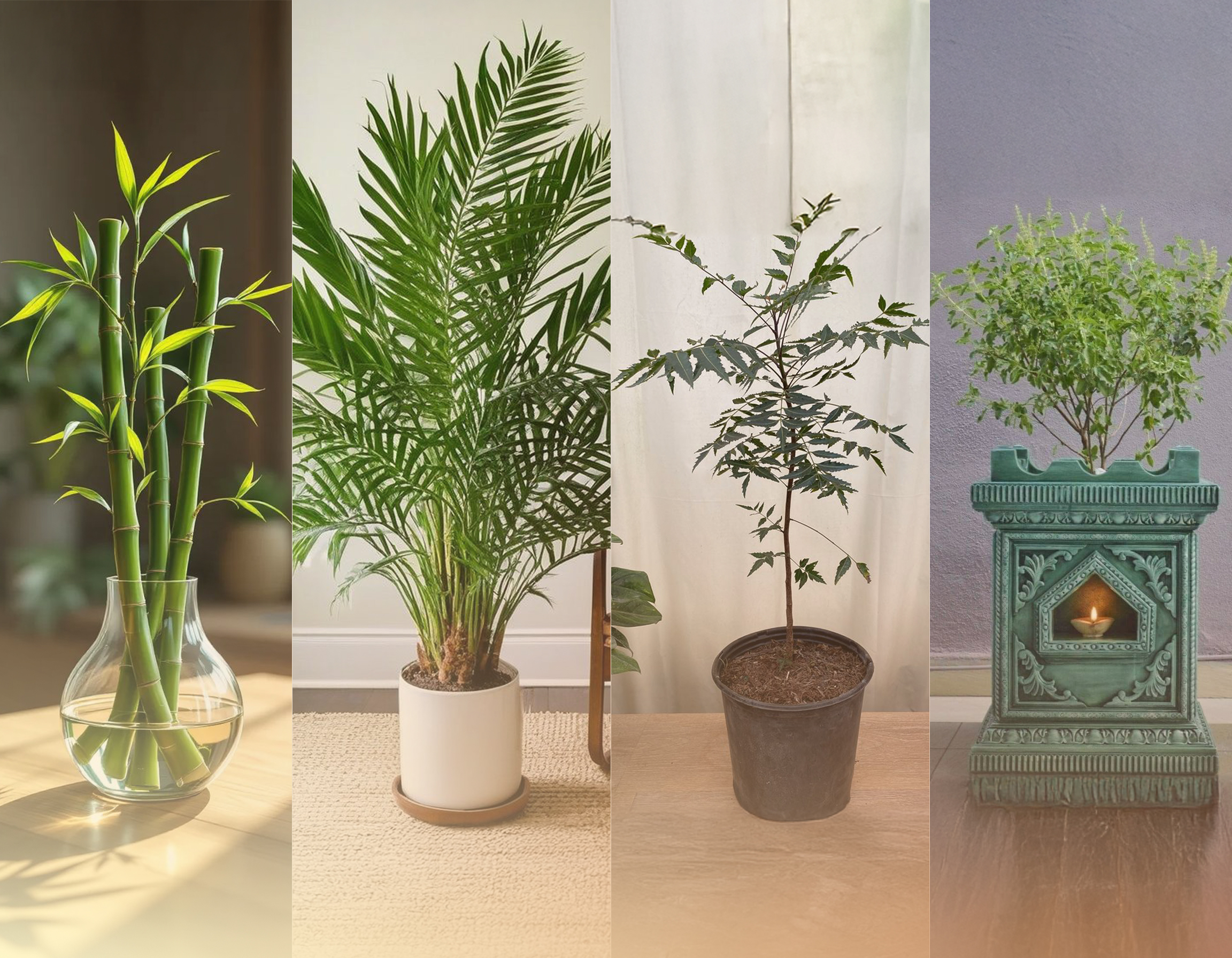
You have carefully picked out the curtains, matched the furniture to your style, and even added a few indoor plants to bring the space alive. But besides everything looking perfect, something still feels off.
Often, the culprit could be as simple and surprising as the plants in your home. In Indian culture, greenery is all about energy. Especially when following Vastu for residential building, choosing the right indoor plants is all about energy alignment.
So, if you are planning to green up your home, this guide is for you. Let us explore plants that are Vastu-approved for your home and plants you should avoid.
Vastu Shastra explains a harmonious relationship between nature and living spaces. Plants are carriers of life force and can attract positive vibrations if chosen correctly. Some plants invite prosperity and good health, while others can unknowingly attract conflict.
When planning plant decor or gardens in homes, applying vastu for residential building helps channel the right energy for every room.
Tulsi
Tulsi is the most spiritually significant and scientifically beneficial plant. Vastu regards it as a purifier of energy, and it is believed to bring peace and positivity. Place it in the North, East, or North-East direction of your home for the best results. Avoid placing it directly on the ground. Keep it in a raised planter.
Benefits:
Areca Palm
Areca Palm is a perfect air-purifying plant. With its soft fronds and easy maintenance, it adds a tropical vibe to your interiors. Best placed in the eastern or northern corners of living rooms. You can place them near the main entrance. According to Vastu for residential building, it brings a cooling and calming presence.
Benefits:
Money Plant
The Money Plant is a classic symbol of financial growth and prosperity. Vastu believes that money plants attract wealth and reduce stress. Grow it indoors in water or soil. Place it in the North East direction of the house. Place the money plant near a window for better growth.
Benefits:
It acts as an air-purifier.
The money plant could be a symbol of financial success when placed right.
Bamboo Plant
Lucky bamboo isn’t just a Feng Shui favorite—it also aligns well with Vastu when placed correctly. It represents growth and good fortune. Keep it in the East or North East direction for best energy flow. Make sure it is healthy and placed in clean water.
Benefits:
Neem Tree
The Neem tree is considered extremely auspicious in Vastu Shastra. This is due to its strong medicinal and purifying properties. It is instructed to keep a neem tree in the north or northeast corner of your home.
Benefits
Cactus
Despite being low-maintenance and trendy, cactus plants are a big no in Vastu. Their sharp thorns are believed to emit negative energy and lead to family disputes and health issues. Especially avoid placing them near entrances and bedrooms. If you must keep one for aesthetics, place it outdoors or on a balcony.
Tamarind Plant
Tamarind trees are a great choice to place in a garden. But these are believed to emit strong negative vibrations when placed near or inside homes. The tree’s energy can disrupt your mental peace. It is said to attract unrest or arguments. Tamarind plant is strictly avoided in vastu for residential building.
Cotton Plant
Cotton plants or artificial cotton flowers may look aesthetic, but according to Vastu, they bring in bad luck and financial instability. Cotton symbolizes stagnation and is linked with loss. Do not keep any dried or fluffy cotton plants inside the house.
Bonsai Plants
Bonsai may look beautiful, but Vastu experts advise against them. The restricted growth of the plant is symbolic of restricted personal and professional growth. These bonsai plants are especially harmful if placed indoors. It limits energy expansion, which is undesirable in vastu for residential building.
Mehendi Plant
According to Vastu, Mehendi plants should not be grown inside or near the house. They have traditional and cosmetic uses. But spiritually, they are believed to emit subtle negative vibrations and may cause unrest in the home environment. They are better suited for temple or outdoor community use than for residential planting.
Final thoughts
Plants are not just decorative items. They are silent energy influencers in your home. When selected and placed mindfully, they enhance the natural harmony and wellness of your living space. Need help designing a vastu-aligned green corner in your home? Our experts at Vedic Vastu will guide you throughout the process. For personalized Vastu guidance, connect with our experts today. Book your consultation now!
 " alt="Karmic Remedies for Big Transits: Vastu, Mantras & Number Healing">
" alt="Karmic Remedies for Big Transits: Vastu, Mantras & Number Healing">

 " alt="Ashtakavarga Explained: A Numerological Map to Success">
" alt="Ashtakavarga Explained: A Numerological Map to Success">

 " alt="Feng Shui 101 – How To Bring Luck Into Your Home">
" alt="Feng Shui 101 – How To Bring Luck Into Your Home">

 " alt="Past Life Karma Revealed: What Nadi Astrology Says About Who You Were Before">
" alt="Past Life Karma Revealed: What Nadi Astrology Says About Who You Were Before">
